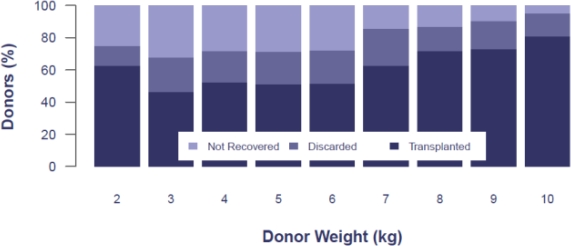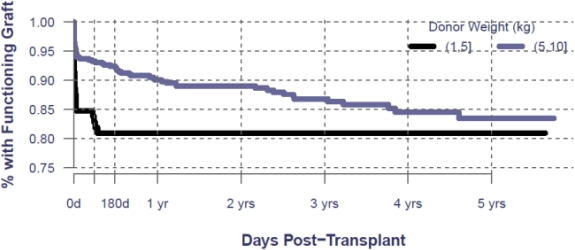Use of Small (<10kg) Kidney Donors in the US.
1Scientific Registry of Transplant Recipients, Minneapolis
2Seattle Children's Hospital, Seattle
3UC Davis Medical Center, Sacremento.
Meeting: 2016 American Transplant Congress
Abstract number: 216
Session Information
Session Name: Concurrent Session: Kidney Transplantation: Allocation, Discard, and HCV
Session Type: Concurrent Session
Date: Monday, June 13, 2016
Session Time: 2:30pm-4:00pm
 Presentation Time: 3:06pm-3:18pm
Presentation Time: 3:06pm-3:18pm
Location: Veterans Auditorium
The supply of kidneys for transplant continues to exceed the demand. Efforts to expand the donor pool have led to interest in small pediatric kidney donors. We reviewed kidney recovery, use, and outcomes for kidneys from donors weighing < 10kg.
Using SRTR standard analysis files, we examined all donors weighing <10 kg January 1, 2010-June 30, 2015; a donor was defined as having at least 1 organ procured for the purpose of transplant. These kidneys are reported to UNOS by the OPO as single left/right or en bloc.
A total of 848 donors (1.9% of 45,557 deceased donors) with 1696 kidneys were available for analysis. The number of transplants ranged from a low of 89 (2010) to 119 (2012) per year, performed in 29 to 40 centers. The disposition of kidneys varied by donor weight. As donor weight increased from 2 to 10 kg, more kidneys were offered for transplant and fewer were not recovered or discarded (Fig. 1). Of the 848 donors whose kidneys were offered for transplant, 683 (81%) were offered en bloc and 165 (19%) as single left/right kidneys. No kidneys from donors weighing less than 5 kg were transplanted as single kidneys despite up to 35% being offered as single kidneys. Graft survival trended lower for donors weighing 2-5 kg (p=0.0687, Fig. 2) with most of the graft losses occurring in the first 6 months. Recipient survival did not differ (p=0.67).
Among small pediatric kidney donors, organ recovery, use, and graft survival vary by donor weight. Potential expansion of the organ pool should focus on increasing recovery, use and graft survival, particularly with donors <5kg. Further study is needed to establish the potential yield of organs from this population to optimize their distribution.
Figure 1. Final disposition of kidneys

Figure 2. Graft survival of kidneys

CITATION INFORMATION: Smith J, Snyder J, Israni A, Kasiske B, Perez R. Use of Small (<10kg) Kidney Donors in the US. Am J Transplant. 2016;16 (suppl 3).
To cite this abstract in AMA style:
Smith J, Snyder J, Israni A, Kasiske B, Perez R. Use of Small (<10kg) Kidney Donors in the US. [abstract]. Am J Transplant. 2016; 16 (suppl 3). https://atcmeetingabstracts.com/abstract/use-of-small-10kg-kidney-donors-in-the-us/. Accessed July 14, 2025.« Back to 2016 American Transplant Congress
